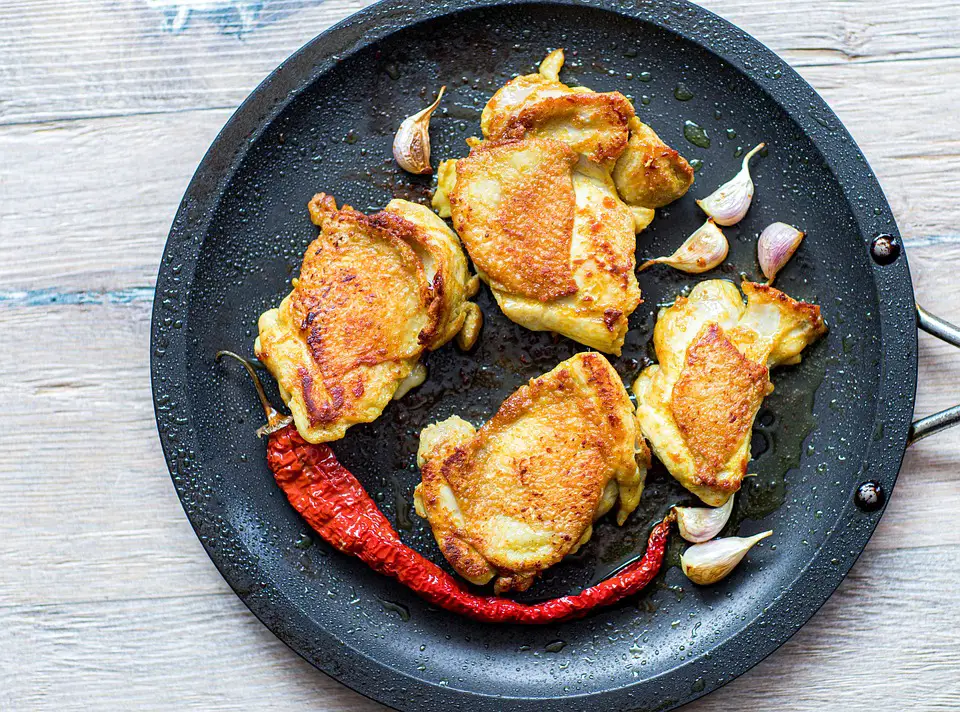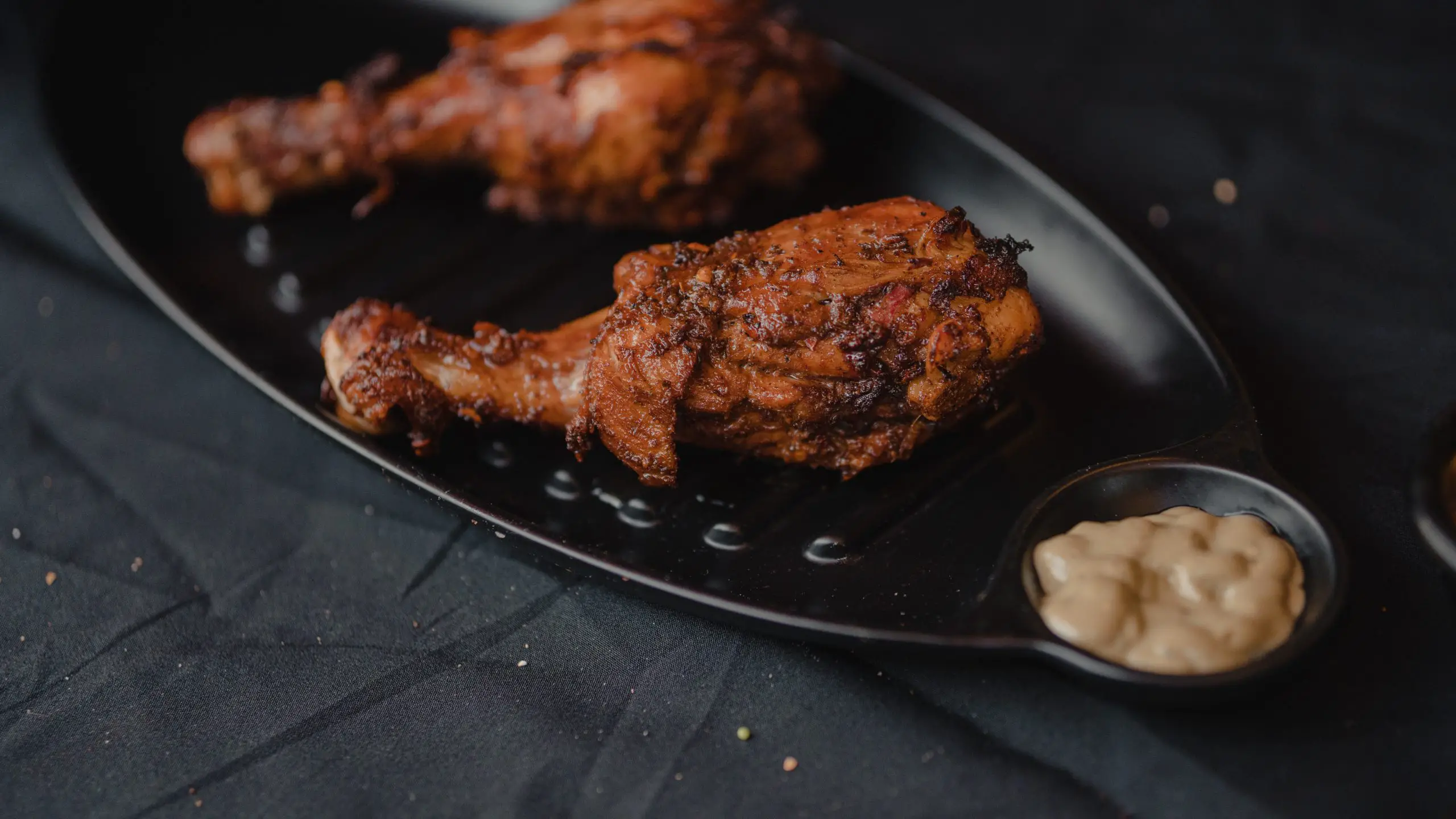We’ve all experienced it: a tonne of meat is always left over after roasting a whole chicken. You don’t want to squander it, but what do you do with it? Can you eat cold chicken too? You can always freeze it for later use or, if you’re careful, put it in the fridge to reheat.
As long as the chicken has been cooked, it can be consumed cold. Make sure to remove any chilled, cooked chicken from the refrigerator when ready to eat it.
You can eat cold chicken, but you must be careful when cooling and storing it. It’s during this period that things can become dangerous with the chicken.

Can you Eat Fully Cooked Chicken Cold?
Consuming chilled chicken is completely safe. How you store it should be your first concern. You should cover the chicken and put it straight in the refrigerator after it has reached room temperature. Keep it off the work surface for a short while.
Chicken doesn’t need to be heated up before eating. However, you must first ensure the following:
The chicken was previously thoroughly cooked.
It should not be kept out for more than two hours at room temperature or one hour if it is higher than 90°F.
In a refrigerator or freezer, the chicken is properly preserved. (See the explanation below)
The cold chicken must be consumed before a certain period passes, before it spoils. (See more specifics below)
Eating cold chicken is not only conceivable but also advantageous for you in several ways. If you don’t have time to cook every day, cooking chicken that you can eat later cold will save you time.
What are the Different Ways of Consuming Cold Chicken?
There are many ways to consume leftover chicken cold, so there’s no need to worry if you don’t want to reheat it. You can try a few of these:
Snack
Sometimes keeping things simple is the best course of action. If you become hungry mid-morning or mid-afternoon, consider nibbling on cold chicken instead of eating your typical unhealthy snacks.
Simply put some on a platter and consume it like nuts or crackers. You will feel satisfied till lunch thanks to its high protein and nutrient content. Even better, you could eat it with a dip!
Salad
Salad Cold chicken is delicious in salads. It is simple, filling, and delicious. It’s the ideal augmentation.
Use a balanced combination of salad leaves and other salad vegetables to assemble your salad. You may make a nice meal by including the chicken and your favorite dressing.
You can even grate some cheese on top if you want to add more.
Sandwiches
Everyone enjoys a good sandwich at lunch. It is the perfect dinner. It’s simple to consume, and you may add whatever you like. You can be certain that none of the delicious leftover chicken goes to waste because cold chicken makes excellent sandwiches.
It is finely sliced, combined with mayonnaise and a dash of mustard, and then piled between buttered bread slices. You could even use cold chicken to add protein and depth to a cheese toastie.
Nachos
You may also use the leftover chicken as a topping for nachos. Shred the meat and add it to your nachos, salsas, and sauces. Of course, you could melt the cheese while warming the chicken through.
What are the Advantages of Consuming Cold Chicken?
You receive all the same advantages from eating your chicken cold as you did when it was newly cooked. Any healthy diet should include chicken because it is a meat that is strong in protein.
Since chicken is lean meat, you don’t need to worry too much about the calories when you eat it, especially if you use a slimmer cut like the breast. Additionally, it can support the health of your heart and bones.
The additional advantage of eating chicken cold is that you won’t waste any nutrient-rich leftovers. You should take all possible measures to prevent food waste because it is still a significant problem.
Additionally, chicken is a high-protein meat source that is excellent for clean eating. You can gain muscle by having cooked chicken, especially chicken breast, available in your refrigerator to eat as a snack before or after working out.
Your meat will take up the seasonings more effectively if you keep the well-cooked chicken in the refrigerator. Knowing how long to marinate chicken will improve the flavor of both hot and cold chicken.
Reference: Detection of Some Antibiotics Residues in Chicken Meat and Chicken Luncheon
The chicken meat and further processed ready-to-eat chicken lunches are not only delicious, simple to cook, and the least expensive of all meats, but they also offer a special, well-balanced source of proteins with vital amino acids, minerals, and vitamins necessary by people of all ages. In the diet of Egyptians, chicken meat and chicken meals make up a significant portion of the normal poultry product intake. In chicken production, antibiotics are frequently utilized for nutritional, prophylactic, growth-promoting, and medicinal purposes.
What are the Risks Associated with Eating Rotten Chicken?
Food poisoning, or a foodborne sickness, can be contracted by eating rotten chicken.
Chicken may be contaminated with bacteria like Campylobacter, Salmonella, and more, increasing the risk of food poisoning.
These bacteria are typically destroyed when fresh chicken is completely cooked.
Cooking and eating rotten chicken must still be avoided. While reheating or cooking can eradicate surface germs, some toxins produced by bacteria can still cause food poisoning if consumed.
High fevers (over 101.5°F or 38.6°C), chills, nausea, vomiting, diarrhea, bloody stools, and dehydration are among the painful and occasionally severe symptoms of food poisoning.
Severe food poisoning occasionally necessitates hospitalization and can potentially be fatal.
Don’t consume your chicken if you think it might be ruined. It’s advisable always to throw away chicken you think has gone rotten.
How to Identify Spoiled Chicken?
There is a probability that the chicken has gone bad if it has been stored in the refrigerator for longer than a few days.
Here are a few indicators that the chicken in your refrigerator has perished:
The “best by” date has passed. It’s more likely that chicken, both raw and cooked, that has passed its “best if used by/before” date has deteriorated.
Alterations in color. Chicken that is raw and cooked and has begun to turn a greyish-green tint has gone bad. Gray-to-green mold growth spots indicate bacterial development.
Smell. As chicken gets bad, raw and cooked pieces produce an ammonia-like odor. It could be difficult to detect this fragrance if the chicken has been marinated in sauces, herbs, or spices.
Texture. A slimy texture indicates rotten chicken. The chicken cannot be rinsed to remove bacteria. Instead, doing so could result in cross-contamination and the transfer of the bacteria from poultry to other foods, utensils, and surfaces.
Throw away the chicken in your fridge if you think it’s gone bad.
How to Properly Store Chicken?
The bacteria that cause foodborne illness should not be kept in chicken storage at a temperature that can increase quickly. The region between 40°F and 140°F is known as the danger temperature zone. In the fridge, raw chicken can be kept for a few days. It should be frozen to prevent it from perishing if it won’t be utilized within the advised time frame. Cooked chicken leftovers should be properly wrapped and stored in the refrigerator as soon as possible. Chicken should not be left at room temperature for longer than two hours. Chicken should be frozen if it won’t be consumed within four days of cooking.
Refrigerating
For several days, raw or cooked chicken can be safely kept in a refrigerator at 40°F or lower. The freshness of the meat at the time of purchase, the temperatures it is subjected to during transportation from the store to home refrigeration, and the type of packaging used will all affect how long it may be chilled.
In a refrigerator set to no more than 40°F, chicken can be safely kept for two to three days. Ground poultry and chicken giblets should only be kept in the fridge for one day. The chicken items should be frozen if you plan to keep them longer. Before you cook it, take the chicken out of the refrigerator.
Freezing
Fresh chicken needs to be kept in the fridge at 40°F or less. It needs to be consumed within two days of the package’s expiration date, and if not, it needs to be frozen.
Although freezing should be avoided since it makes chicken less soft and juicy, it must be done if the chicken won’t be used within that time frame to keep it from spoiling.
Make sure the chicken is as fresh as possible before freezing. Take it out of the packaging it was originally in, and then tightly wrap it in plastic wrap, foil, or freezer paper.
You should double-wrap your items if you plan to keep them for more than two months. To avoid the formation of ice crystals in any unwrapped areas, ensure the wrap is pushed securely against the whole surface of the chicken.
Because moisture has been removed from the meat, the chicken has become tough in certain regions, leading to ice crystals forming. “Freezer burn” is the name given to this condition. To know exactly how long it has been in the freezer, mark the wrapped package with the contents and the date.
What are the Different Methods of Defrosting Chicken?
According to the USDA, there are three secure ways to defrost the chicken. One technique completely omits to thaw.
Utilize a Microwave
Although it’s the quickest option, chicken must be cooked immediately after microwave thawing. The possibly harmful bacteria can be eliminated only after the chicken is properly cooked. Because germs thrive at temperatures between 40 and 140 °F (4.4 and 60 °C), which microwaves cook poultry to, this is the case. The possibly harmful bacteria can be eliminated o
Employ Chilly Water
Two to three hours should pass during this.
Put the chicken in a bag of plastic that won’t leak. Applying this approach will prevent any bacterial contamination of the food and water damage to the beef tissue.
Put cold water in a big dish or the kitchen sink. Put the chicken in a bag in water.
Every 30 minutes, the water should be changed.
Utilize a Fridge
The greatest preparation is needed for this strategy, but it is also the most highly advised. Plan your meals because the chicken usually takes a day to thaw. The fowl can be refrigerated after thawing for a day or two before cooking.
Conclusion
While the answer to the question, “Can you eat fully cooked chicken cold?” may surprise you, the answer is “yes!” It is entirely possible to eat cold chicken if you prepare it properly. Just remember to keep it in the fridge and keep it in a tightly sealed container. Fully cooked chicken will keep for about two to three days if properly stored. However, if you leave it out for more than two days, the chicken may develop bacteria and spoil.
You can eat fully-cooked chicken cold, but you should remember that it is best to consume it within 48 hours after preparation. Unlike some other meats, fully cooked chicken can be consumed cold if you keep it in a refrigerator. The only exception is chicken that has been cooked with dairy. You should also check the use-by date and store it properly.
